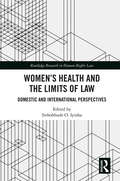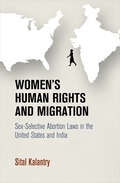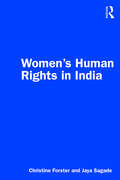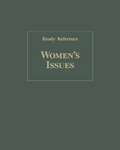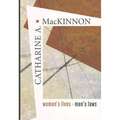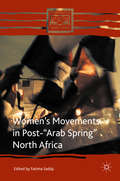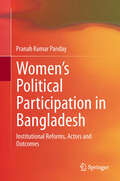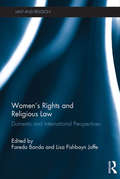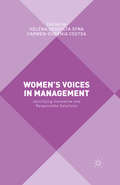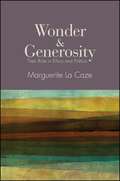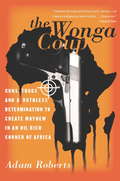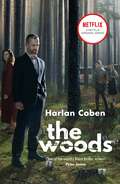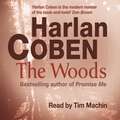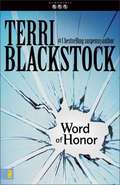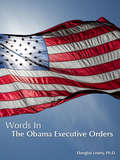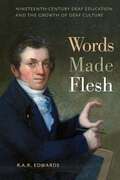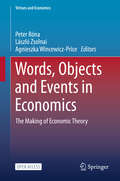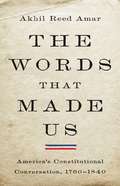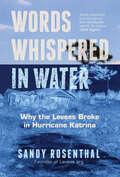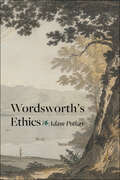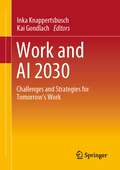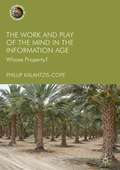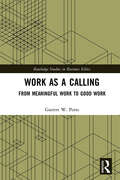- Table View
- List View
Women's Health and the Limits of Law: Domestic and International Perspectives (Routledge Research in Human Rights Law)
by Irehobhude O. IyiohaDespite some significant advances in the creation and protection of rights affecting women’s health, these do not always translate into actual health benefits for women. This collection asks: 'What is an effective law and what influences law’s effectiveness or ineffectiveness? What dynamics, elements, and conditions come together to limit law’s capacity to achieve instrumental goals for women’s health and the advancement of women’s health rights?' The book presents an integrated, co-referential and sustained critical discussion of the normative and constitutive reasons for law’s limited effectiveness in the field of women’s health. It offers comprehensive and cohesive explanatory accounts of law’s limits and for the first time in the field, introduces a distinction between formal and substantive effectiveness of laws. Its approach is trans-systemic, multi-jurisdictional and comparative, with a focus on six countries in North America, Europe, Asia, and Africa and international human rights case law based on matters arising from Hungary, Portugal, Spain, Slovakia, the Czech Republic, Peru and Bolivia. The book will be a valuable resource for educators, students, lawyers, rights advocates and policymakers working in women’s health, socio-legal studies, human rights, feminist legal studies, and legal philosophy more broadly.
Women's Human Rights: Mixed Norms and Identities in Infertility Management in Zimbabwe
by Anne Hellum Henriette Sinding AasenMixed Norms and Identities in Infertility Management in Zimbabwe.
Women's Human Rights and Migration: Sex-Selective Abortion Laws in the United States and India (Pennsylvania Studies in Human Rights)
by Sital KalantrySome of the most hotly contested international women's rights issues today arise from the movement of peoples from one country to another and the practices they purportedly bring with them. In Women's Human Rights and Migration, Sital Kalantry focuses on immigrants of Asian descent living in the United States who are believed to abort female fetuses because they do not want a female child. <P><P>While sex-selective abortion is a human rights concern in India, should we, for that reason, assume that the practice undermines women's equality in the United States? Although some pro-choice feminists believe that these prohibitions on sex-selective abortion promote women's equality, other feminists fiercely oppose such laws, characterizing them as a Trojan horse in the larger pursuit to overturn the reproductive rights guaranteed by Roe v. Wade. <P><P>Nearly half of state legislatures in the United States have proposed laws restricting sex-selective abortion since 2009 and nine have adopted them.Kalantry argues that traditional feminist legal theories and international human rights law fail to provide adequate guidance in examining the human rights implications of the reproductive practices of immigrant women, evidenced by the fact that both supporters and opponents ground their claims in women's equality. She advocates instead for a context-based approach that is open to the possibility that sex-selective abortion practices will have significantly different human rights implications when they emerge in different national contexts. <P><P>The product of extensive empirical and interdisciplinary research, Kalantry's book investigates the actual occurrence of sex-selective abortion among Asian Americans, the social and cultural contexts in which women in the United States and India practice sex-selective abortion, and the consequences of the laws in each country for women's equality. Women's Human Rights and Migration develops a transnational feminist legal approach to examining and legislating contested acts that result from migration.
Women’s Human Rights in India
by Christine Forster Jaya SagadeThis book focusses on women’s human rights in India. Drawing on case studies, it provides a clear overview of the key sources on gender and rights in the country. Further, it contextualizes women’s rights at the critical intersection of caste, religion and class, and analyses barriers to the realization of women’s human rights in practice. It also develops strategies for moving forward towards greater recognition, protection, promotion and fulfilment of women’s human rights in India. Drawing on critical pedagogical tools to analyse groundbreaking court cases, this book will be a key text in human rights studies. It will be indispensable to students, scholars and researchers of gender studies, sociology, law and human rights.
Women’s Issues (Volume #1)
by Margaret McfaddenVolume I is from "Abbott, Edith and Grace" to "Firestone, Shulamith". A thorough and carefully prepared encyclopedia containing entries for 696 terms, personages, organizations, historical events, and contemporary issues pertaining to women in the US and Canada. Entries are arranged A-Z and encompass US Supreme Court cases and federal legislation; education; employment; feminist theory; health, sexuality, and reproductive rights; the role of women in literature, media, and the arts; marriage and the family; violence; politics and civil rights; race, ethnicity and religion; female athletic participation; and women's experience in American wars. Each entry begins with a summary of issues and significance. Articles of 1,250 words or more conclude with a bibliography; those of more than 2,500 words include annotations. Appendices include lists of institutions offering women's studies programs or degrees; important landmarks, monuments, and historical sites; museums and archives devoted to women's studies; selected organizations; and a chronology of relevant US Supreme Court decisions.
Women's Lives - Men's Laws
by Catharine A. MackinnonIn the past twenty-five years, no one has been more instrumental than Catharine MacKinnon in making equal rights real for women. As Peter Jennings once put it, more than anyone else in legal studies, she "has made it easier for other women to seek justice. " This collection, the first since MacKinnon's celebrated Feminism Unmodified appeared in 1987, brings together previously uncollected and unpublished work in the national arena from 1980 to the present, defining her clear, coherent, consistent approach to reframing the law of men on the basis of the lives of women. By making visible the deep gender bias of existing law, MacKinnon has recast legal debate and action on issues of sex discrimination, sexual abuse, prostitution, pornography, and racism. The essays in this volume document and illuminate some of the momentous and ongoing changes to which this work contributes; the recognition of sexual harassment, rape, and battering as claims for sexual discrimination; the redefinition of rape in terms of women's actual experience of sexual violation; and the reframing of the pornography debate around harm rather than morality. The perspectives in these essays have played an essential part in changing American law and remain fundamental to the project of building a sex-equal future.
Women's Movements in Post-"Arab Spring" North Africa
by Fatima SadiqiUnexpected and transformative revolutions broke off in North Africa and quickly spread to the Middle East and the rest of the world in 2010 and 2011. Spontaneous, leaderless, youth-driven, and backed by social media, these revolutions called for karamah (dignity) and democracy. Centering on women's movements before, during, and after the revolutions, Women's Movements in Post-"Arab Spring" North Africa highlights the broader sources of authority that affected the emergence of new feminist actors and agents and their impact on the sociopolitical landscapes of the region. Until recently, studies of North African women's movements have focused on single aspects of women's achievements at a time. By providing a comparative analysis, this book for the first time sheds light not only on the role that these superstructures play in shaping women's experiences in North Africa, but also on the rich variety of women's responses to authority, and their potential contributions to African and global feminist thought. From the pre-history of the revolutions to their aftermath, the far-reaching historical and national scope of this collection expands the study of women's movements in North Africa beyond national borders, while still paying close attention to local characteristics.
Women’s Political Participation in Bangladesh
by Pranab Kumar PandayThis volume offers an understanding of institutional reforms, gender-related policy dynamics, the role of different actors in the policy process, and the impact of a particular policy on the state of women's political participation in Bangladesh. The discussion is set against the background of the Fourth World Conference on Women, 1995, in Beijing, in which a Platform for Action signed by heads of governments expressed their countries' commitment to achieve 'gender equality and empowerment of women' through ensuring integration of the gender perspective at all levels. In Bangladesh, notable among the initiatives undertaken was the enactment of the Local Government (Union Parishads) (Second Amendment) of 1997, through which one-third of seats were reserved for women in the Union Parishad (UP) and the system of direct election was introduced to elect women members in reserved seats. The Act of 1997 is considered to be a milestone, since it has enhanced women's participation in the local government politics significantly. Against this background, the specific research questions that have been addressed in this volume include: the necessity of reform for enhancing women's participation in politics; the context against which the Government of Bangladesh enacted the Act and the reasons such an initiative was not taken earlier; the actors behind the reforms and their role in the reform process; and the impact of the reform on the state of women's participation at the local level in Bangladesh.
Women's Rights and Religious Law: Domestic and International Perspectives (Law and Religion)
by Fareda Banda Lisa Fishbayn JoffeThe three Abrahamic faiths have dominated religious conversations for millennia but the relations between state and religion are in a constant state of flux. This relationship may be configured in a number of ways. Religious norms may be enforced by the state as part of a regime of personal law or, conversely, religious norms may be formally relegated to the private sphere but can be brought into the legal realm through the private acts of individuals. Enhanced recognition of religious tribunals or religious doctrines by civil courts may create a hybrid of these two models. One of the major issues in the reconciliation of changing civic ideals with religious tenets is gender equality, and this is an ongoing challenge in both domestic and international affairs. Examining this conflict within the context of a range of issues including marriage and divorce, violence against women and children, and women’s political participation, this collection brings together a discussion of the Abrahamic religions to examine the role of religion in the struggle for women’s equality around the world. The book encompasses both theory and practical examples of how law can be used to negotiate between claims for gender equality and the right to religion. It engages with international and regional human rights norms and also national considerations within countries. This book will be of great relevance to scholars and policy makers with an interest in law and religion, gender studies and human rights law.
Women's Voices in Management: Identifying Innovative and Responsible Solutions
by Helena Desivilya Syna Carmen Eugenia CosteaWomen's Voices in Management examines a wide array of women's voices across different geo-political, social and organizational contexts in management. Extant research provides clear evidence on gendering in organizations throughout all the ranks including top management.
Wonder and Generosity: Their Role in Ethics and Politics
by Marguerite La CazeWonder and Generosity provides a fresh account of how the passions of wonder—based on accepting others' differences—and generosity—based on self-respect and mutual respect—can supplement each other to establish an ethics and politics of respect for sexual and cultural differences. Drawing on the work of both historical and contemporary thinkers, such as Descartes, Kant, Beauvoir, Arendt, Irigaray, and Derrida, Marguerite La Caze applies her theoretical framework to a range of contemporary political challenges, including asylum-seeker policies, justice for indigenous and other oppressed groups, debates over official apologies, gender equality, and responses to radical evil. La Caze's book contributes to understanding the relationship between equality and difference in public life, the extent to which we must regard others as similar in the name of equality, and the extent to which we must acknowledge significant differences.
The Wonga Coup: Guns, Thugs, and a Ruthless Determination to Create Mayhem in an Oil-Rich Corner of Africa
by Adam RobertsEquatorial Guinea is a tiny country roughly the size of the state of Maryland. Humid, jungle covered, and rife with unpleasant diseases, natives call it Devil Island. Its president in 2004, Obiang Nguema, had been accused of cannibalism, belief in witchcraft, mass murder, billiondollar corruption, and general rule by terror. With so little to recommend it, why in March 2004 was Equatorial Guinea the target of a group of salty British, South African and Zimbabwean mercenaries, travelling on an American-registered ex-National Guard plane specially adapted for military purposes, that was originally flown to Africa by American pilots? The real motive lay deep below the ocean floor: oil. In The Dogs of War, Frederick Forsyth effectively described an attempt by mercenaries to overthrow the government of Equatorial Guinea - in 1972. And the chain of events surrounding the night of March 7, 2004, is a rare case of life imitating art-or, at least, life imitating a 1970s thriller-in almost uncanny detail. With a cast of characters worthy of a remake of Wild Geese and a plot as mazy as it was unlikely, The Wonga Coup is a tale of venality, overarching vanity and greed whose example speaks to the problems of the entire African continent.
The Woods: NOW A NETFLIX ORIGINAL SERIES
by Harlan CobenTwenty years ago, four teenagers disappeared in the woods at a summercamp. Now, two decades later, everything is changing...Paul Copeland's sister went missing 20 years ago. Now raising a daughter alone, Cope balances family life with a career as a prosecutor. But when a homicide victim is found with evidence linking him to Cope, the well-buried secrets of the past are threatening everything. Is this body one of the campers who disappeared with his sister? Could his sister be alive...? Confronting his past, Cope must decide what is better left hidden in the dark and what truths can be brought to light...
The Woods: NOW A NETFLIX ORIGINAL SERIES
by Harlan CobenPaul Copeland's sister went missing 20 years ago. Now raising a daughter alone, Cope balances family life with a career as a prosecutor. But when a homicide victim is found with evidence linking him to Cope, the well-buried secrets of the past are threatening everything. Is this body one of the campers who disappeared with his sister? Could his sister be alive...? Confronting his past, Cope must decide what is better left hidden in the dark and what truths can be brought to light...Read by Tim Machin(p) 2006 Orion Publishing Group
Word Of Honor
by Terri BlackstockOf the four people in the Newpointe post office when the bomb went off, three were killed instantly. The fourth, a 5 year old boy, lies comatose in the hospital and might not survive. Who would do such a thing? The answer comes in the form of a gunman crashing through the door of the hotel room where Jill Clark is staying. With a rifle barrel pointed at her temple, the young attorney suddenly finds herself the hostage of a desperate man whose actions barely fit his claim that he's innocent of the bombing. Only later, when the suspect is behind bars, does Jill wonder whether he's as guilty as he appears. Prompted by a terrifying attempt on her life, Jill and old flame Dan Nichols dig deeper into the case. But standing in their way is an obstacle Jill hasn't counted on: the power of a covenant. It could change her life. Or, with the clock ticking, it could seal her death. (Newpointe 911 book 3. Sequel to Shadow of Doubt.)
Words in the Obama Executive Orders
by Douglas LowryContents include the full text of President Obama's executive orders January 2009 through August 2012, the Declaration of Independence, the Constitution of the United States, plus an introduction and links to cloud-based search and research tools. These tools equip the reader to learn about presidential orders and to arrive at personal judgments about the health of the intended balance of power among the executive, congress, and judiciary of the United States. The introduction invites the reader to substitute a "power / service" dimension for the "left / right" way of thinking that corrodes our ability to collaborate in this nation's political life.
Words Made Flesh: Nineteenth-Century Deaf Education and the Growth of Deaf Culture (The History of Disability #4)
by R. A. EdwardsDuring the early nineteenth century, schools for the deaf appeared in the United States for the first time. These schools were committed to the use of the sign language to educate deaf students. Manual education made the growth of the deaf community possible, for it gathered deaf people together in sizable numbers for the first time in American history. It also fueled the emergence of Deaf culture, as the schools became agents of cultural transformations.Just as the Deaf community began to be recognized as a minority culture, in the 1850s, a powerful movement arose to undo it, namely oral education. Advocates of oral education, deeply influenced by the writings of public school pioneer Horace Mann, argued that deaf students should stop signing and should start speaking in the hope that the Deaf community would be abandoned, and its language and culture would vanish. In this revisionist history, Words Made Flesh explores the educational battles of the nineteenth century from both hearing and deaf points of view. It places the growth of the Deaf community at the heart of the story of deaf education and explains how the unexpected emergence of Deafness provoked the pedagogical battles that dominated the field of deaf education in the nineteenth century, and still reverberate today.
Words, Objects and Events in Economics: The Making of Economic Theory (Virtues and Economics #6)
by Peter Róna László Zsolnai Agnieszka Wincewicz-PriceThis open access book examines from a variety of perspectives the disappearance of moral content and ethical judgment from the models employed in the formulation of modern economic theory, and some of the papers contain important proposals about how moral judgment could be reintroduced in economic theory. The chapters collected in this volume result from the favorable reception of the first volume of the Virtues in Economics series and represent further contributions to the themes set out in that volume: (i) examining the philosophical and methodological fallacies of this turn in modern economic theory that the removal of the moral motivation of economic agents from modern economic theory has entailed; and (ii) proposing a return descriptive economics as the means with which the moral content of economic life could be restored in economic theory.This book is of interest to researchers and students of the methodology of economics, ethics, philosophers concerned with agency and economists who build economic models that rest in the intention of the agent.
The Words That Built America
by Georgia Department of EducationThis collection of documents creates civic awareness, and an understanding of the values that make America great.
The Words That Made Us: America's Constitutional Conversation, 1760-1840
by Akhil Reed AmarA history of the American Constitution's formative decades from a preeminent legal scholarWhen the US Constitution won popular approval in 1788, it was the culmination of thirty years of passionate argument over the nature of government. But ratification hardly ended the conversation. For the next half century, ordinary Americans and statesmen alike continued to wrestle with weighty questions in the halls of government and in the pages of newspapers. Should the nation's borders be expanded? Should America allow slavery to spread westward? What rights should Indian nations hold? What was the proper role of the judicial branch? In The Words that Made Us, Akhil Reed Amar unites history and law in a vivid narrative of the biggest constitutional questions early Americans confronted, and he expertly assesses the answers they offered. His account of the document's origins and consolidation is a guide for anyone seeking to properly understand America's Constitution today.
Words Whispered in Water: Why the Levees Broke in Hurricane Katrina
by Sandy Rosenthal&“Anyone who is interested in Hurricane Katrina, and in America&’s failing infrastructure, will want to read this book . . . a fast-paced narrative.&” —Scott G. Knowles, Drexel University2020 Nautilus Silver Winner In the aftermath of one of the worst disasters in US history, Words Whispered in Water tells the story of one woman&’s fight, against all odds, to expose a mammoth federal agency—and win. In 2005, the entire world watched as a major US city was nearly wiped off the map. The levees ruptured and New Orleans drowned. But while newscasters attributed the New Orleans flood to &“natural catastrophes&” and other types of disasters, citizen investigator Sandy Rosenthal set out to expose the true culprit and compel the media and government to tell the truth. This is her story. When the protective steel flood-walls broke, the Army Corps of Engineers—with cooperation from big media—turned the blame elsewhere. In the chaotic aftermath, Rosenthal heroically exposes the federal agency&’s egregious design errors and changes the narrative surrounding the New Orleans flood. This engaging and revealing tale of man versus nature and man versus man is a horror story, a mystery, and David and Goliath story all in one. &“Reveals what it takes to hold the powerful to account.&” —Publishers Weekly &“There are only a few civilians that fight like real warriors. Sandy Rosenthal is one of them.&” —Russel L. Honoré, Lieutenant General, United States Army (Ret.)
Wordsworth's Ethics
by Adam PotkayA comprehensive examination that breathes new life into Wordsworth and the ethical concerns that were vital to his nineteenth-century readers.Why read Wordsworth’s poetry—indeed, why read poetry at all? Beyond any pleasure it might give, can it make one a better or more flourishing person? These questions were never far from William Wordsworth’s thoughts. He responded in rich and varied ways, in verse and in prose, in both well-known and more obscure writings.Wordsworth's Ethics is a comprehensive examination of the Romantic poet’s work, delving into his desire to understand the source and scope of our ethical obligations. Adam Potkay finds that Wordsworth consistently rejects the kind of impersonal utilitarianism that was espoused by his contemporaries James Mill and Jeremy Bentham in favor of a view of ethics founded in relationships with particular persons and things. The discussion proceeds chronologically through Wordsworth’s career as a writer—from his juvenilia through his poems of the 1830s and '40s—providing a valuable introduction to the poet’s work. The book will appeal to readers interested in the vital connection between literature and moral philosophy.
Work and AI 2030: Challenges and Strategies for Tomorrow's Work
by Inka Knappertsbusch Kai GondlachIn ten years, we will take working with artificial intelligence (AI) more for granted than using cell phones today. 78 recognized experts from practice and research provide deep insights and outlooks regarding the influence of AI on everyday working life in 2030, explaining with practical tips how you can prepare for this development.The 41 concise articles cover a broad spectrum in the area examined in each case. Thanks to a standardized structure, they include a summary of the status quo, concrete examples, future expectations, an overview of challenges and possible solutions, and practical tips.The volume begins with societal and ethical issues before discussing legal considerations for employers and HR professionals, as well as the administration of justice. The other chapters examine the impact of AI on the world of work in 2030 in the sectors of business, industry, mobility and logistics, medicine and pharmaceuticals, and (further) education.
The Work and Play of the Mind in the Information Age: Whose Property? (Frontiers of Globalization)
by Phillip Kalantzis-CopeThis book tells a series of living stories about a domain of social activity, "the work and play of the mind," in a particular historical epoch: the "information age. " The stories concern political processes and movements as varied as the World Trade Organization's Trade-Related Aspects of Intellectual Property Rights, China's Great Firewall, practices of image sharing in social media, Occupy Wall Street, The Arab Spring, The Alt-Right, and the use of geographical indications by indigenous peoples and farmers to defend their lifestyles. In its theoretical analysis, the book illuminates four alternative political agendas for the work and play of the mind. These four "propertyscapes" represent competing visions for social life, framing projects for collective political action that are at times competing, at times overlapping. The author prompts us to consider whose property is the work and play of the mind, as well as addressing larger questions regarding the framing of political space, the kinds of political communities we may need for the future, and the changing place of the work and play of the mind within these social imaginaries. The book will be of interest to students and scholars across a range of disciplines including media and communications, arts and design, law, politics and interdisciplinary social sciences.
Work as a Calling: From Meaningful Work to Good Work (Routledge Studies in Business Ethics)
by Garrett W. PottsAmidst the exponentially growing interest in "work as a calling," contemporary discussions have taken an individualistic turn away from the earlier prosocial character that once marked this orientation to work. Now, discussions about "work as a calling" mostly prioritize personal fulfilment via the pursuit of deeply "meaningful work." Excessive focus has been placed on the experience of meaningful work in ways that are detached from the genuinely good workplace ends that allow for such a meaningful experience to ensue. This book provides a novel paradigm for reimagining the idea of "work as a calling," which serves as a corrective that better supports the individuals’ search for meaning and their contribution to the common good, arguing that the two go hand in hand, and so they cannot be separated. Thus, the key idea captured herein is not simply that scholars have misunderstood the very notion of "work as a calling" by implying that it is essentially just synonymous with meaningful work, but, even more importantly, the point is that scholars and laypersons alike often fail to realize how true meaning ensues as a result of a genuine concern for contributing to human flourishing and the common good through one’s work. Providing a new perspective on "work as a calling" by examining the issue from the perspective of morality rather than self-actualization, this volume will be of interest to researchers, academics, professionals, and students in the fields of business ethics, management, leadership, and organizational studies.
